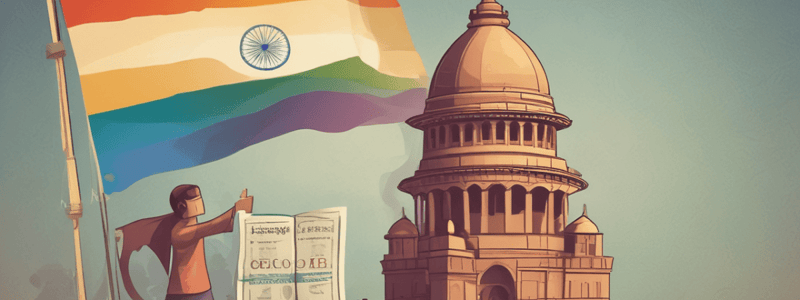Podcast
Questions and Answers
What part of the Indian Constitution includes the Directive Principles of State Policy?
What part of the Indian Constitution includes the Directive Principles of State Policy?
- Part V
- Part II
- Part IV (correct)
- Part III
In which year did the 42nd Amendment Act introduce the Fundamental Duties into the Indian Constitution?
In which year did the 42nd Amendment Act introduce the Fundamental Duties into the Indian Constitution?
- 1950
- 1976 (correct)
- 1980
- 2002
Which Constitutional Amendment added one more Fundamental Duty to the original list?
Which Constitutional Amendment added one more Fundamental Duty to the original list?
- 42nd Amendment Act of 1976
- 52nd Amendment Act of 1990
- 75th Amendment Act of 1985
- 86th Amendment Act of 2002 (correct)
As per the Indian Constitution, which of the following is not justiciable?
As per the Indian Constitution, which of the following is not justiciable?
In which case did the Supreme Court rule that the Indian Constitution is based on a balance between Fundamental Rights and Directive Principles?
In which case did the Supreme Court rule that the Indian Constitution is based on a balance between Fundamental Rights and Directive Principles?
Which concept does the Indian Constitution uphold by not supporting a specific religion as the state's official religion?
Which concept does the Indian Constitution uphold by not supporting a specific religion as the state's official religion?
What is the significance of Fundamental Rights in India?
What is the significance of Fundamental Rights in India?
In which part of the Constitution are the Fundamental Rights of Indian citizens defined?
In which part of the Constitution are the Fundamental Rights of Indian citizens defined?
What is the role of the Supreme Court regarding Fundamental Rights?
What is the role of the Supreme Court regarding Fundamental Rights?
How are the Fundamental Rights different from Directive Principles of State Policy?
How are the Fundamental Rights different from Directive Principles of State Policy?
What is the purpose of the Independence Safeguards mentioned in the text?
What is the purpose of the Independence Safeguards mentioned in the text?
Which part of the Constitution deals with the six broad categories of Fundamental Rights?
Which part of the Constitution deals with the six broad categories of Fundamental Rights?
Which of the following is NOT one of the Fundamental Rights enshrined in the Indian Constitution?
Which of the following is NOT one of the Fundamental Rights enshrined in the Indian Constitution?
Which of the following statements about the Right to Freedom of Religion is NOT true?
Which of the following statements about the Right to Freedom of Religion is NOT true?
What is the primary purpose of the Right to Constitutional Remedies?
What is the primary purpose of the Right to Constitutional Remedies?
According to the Indian Constitution, which of the following is NOT a valid restriction on the Right to Freedom of Speech and Expression?
According to the Indian Constitution, which of the following is NOT a valid restriction on the Right to Freedom of Speech and Expression?
Which of the following is NOT a provision under the Cultural and Educational Rights in the Indian Constitution?
Which of the following is NOT a provision under the Cultural and Educational Rights in the Indian Constitution?
What is the significance of the Right against Exploitation in the Indian Constitution?
What is the significance of the Right against Exploitation in the Indian Constitution?
Flashcards are hidden until you start studying
Study Notes
Fundamental Rights
- Right to Equality (Articles 14-18) includes equality before law, prohibition of discrimination on grounds of religion, race, caste, sex or place of birth, and equality of opportunity in matters of employment.
- The State has the right to impose reasonable restrictions on fundamental rights.
Right against Exploitation
- Prohibition of traffic in human beings, begar, and other forms of forced labour.
- Prohibition of employment of children in factories, etc.
- The Constitution prohibits the employment of children under 14 years in hazardous conditions.
Right to Freedom of Religion
- The Constitution guarantees the secular nature of Indian polity.
- Equal respect is given to all religions.
- Freedom of conscience, profession, practice and propagation of religion.
- The State has no official religion.
- Every person has the right to freely practice his or her faith, and establish and maintain religious and charitable institutions.
Cultural and Educational Rights
- These rights protect the rights of religious, cultural and linguistic minorities, facilitating them to preserve their heritage and culture.
- Educational rights ensure education for everyone without any discrimination.
Right to Constitutional Remedies
- The Constitution guarantees remedies if citizens' fundamental rights are violated.
- Citizens can approach the courts if their rights are violated.
- Citizens can directly go to the Supreme Court, which can issue writs for enforcing fundamental rights.
Directive Principles of State Policy
- The Directive Principles are a "new aspect" of the Indian Constitution.
- They are listed in the Constitution's Part IV.
- The Directive Principles aim to ensure social and economic justice for citizens.
- They are inherently not justiciable.
- The balance between the Fundamental Rights and the Directive Principles is essential, as ruled by the Supreme Court in the Minerva Mills case (1980).
Fundamental Duties
- The fundamental obligations of citizens were introduced by the 42nd Amendment Act of 1976.
- One more essential obligation was added by the 86th Constitutional Amendment Act of 2002.
- The duties are expectations placed on every citizen, while the rights are offered to the people as guarantees.
Indian Secularism
- India's Constitution upholds a secular government.
- The state does not support a specific religion as the official religion.
- The idea seeks to create a secular state.
Sovereign, Secular, Democratic
- The people of India have supreme power and authority to decide on internal and external matters.
- The government cannot be dictated by external power.
- There is no state religion in India, and citizens have complete freedom to practise and profess any religion or faith of their choice.
- The government machinery cannot discriminate against or favour any religion or faith and its followers.
- In India, it is a democratic form of government where people enjoy equal rights, choose their leaders, and the government has to function according to certain basic rules ensuring maximum welfare of the people.
Studying That Suits You
Use AI to generate personalized quizzes and flashcards to suit your learning preferences.




